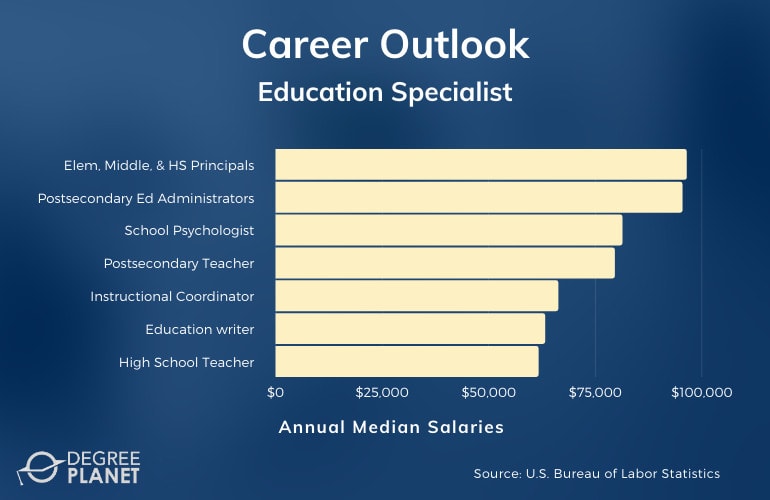Is an EdS worth it? Advances in technology and changes in culture and government policy are quickly transforming education. Because of this, many find this to be an exciting time to work in the field of education. An education specialist degree (EdS degree) can help you make significant contributions to the field.

Editorial Listing ShortCode:
An EdS degree is a highly specialized degree designed to provide expertise beyond the masters level. It’s generally geared towards people who want to work in high level administrative and organizational roles, or in various specialized educational roles.
Is an EdS Worth it?

Yes, an Education Specialist (Ed.S.) is worth it for many students. The Bureau of Labor Statistics is projecting 5% job growth in education, training, and library occupations over the next 10 years.
Common education specialist careers in this field include high school principal, superintendent, learning analyst, school psychologist, training and development specialist, special education teacher, education writer, and school administrator.
An Ed.S. is a highly specialized qualification that may give you opportunities in higher level educational leadership, planning, and organization. If you prefer remaining in the classroom, it can also help you become a more qualified teacher.
An Ed.S. can also provide one of the only routes to becoming a psychologist without getting your PhD. Depending on your state, the degree may be sufficient to earn your licensure to be a school psychologist.
Editorial Listing ShortCode:
The Ed.S. degree goes beyond a master’s degree in its level of focus. It’s often considered ideal for educational professionals that want to elevate their credentials, but don’t have the time or inclination to earn a doctorate in higher education (Ed.D.). Depending on their career and education goals, though, an Ed.D. is worth it for some students.
With an Ed.S. degree, you may design curriculums, lead teachers, run school administrations, and shape education on a broad scale.
How to Decide Whether an Education Specialist (Ed.S.) is Right for You

Though an education specialist (Ed.S) degree can help open the door to many lucrative and exciting careers, it may not be right for everyone in every circumstance.
Here are three reasons that an Ed.S. might be the right choice for you:
1. You enjoy working in education.
If you’re already working as an educator and looking for a credential to improve your value and your earning potential, an Ed.S. may be right for you.
An Ed.S. can help you obtain the focused, specialized knowledge you need to stand out from the pack. It may also open entirely new pathways in school administration, school psychology, training and development, and education leadership.
2. You want to influence education beyond the classroom.

Many people use their Ed.S. degree to get opportunities in high-level education administrative and leadership.
Being a principal, training and development specialist, or administrator can give you opportunities to affect education at a broad level.
3. You want to be a school psychologist.
An Ed.S. with a focus in school psychology may qualify you for licensure as a school psychologist in certain states.
It’s one of the few routes through which you can become a psychologist without earning a PhD. If any of these goals resonate with you, an Ed.S. may be the right choice.
5 Things You Can Do with an Education Specialist Degree

An education specialist degree (EdS) can help open the door a wide range of exciting careers in the education industry.
Here are five possible things you can do with an EdS:
1. Elementary, Middle, or High School Principal
School principals oversee every aspect of a school’s operations. They lead administrative staff and faculty, oversee curriculum design and implementation, and ensure school safety. Principals may also work one-on-one with students to help guide and motivate them in both their educations and their personal lives.
Editorial Listing ShortCode:
Principals communicate school plans and events with parents and the greater community. According to the Bureau of Labor Statistics, school principals have a median salary of $98,490 per year and a projected job growth of 4%.
2. Special Education Teachers

Some students have special educational needs and special education teachers are there to help them.
Special education teachers teach students with physical, mental, or emotional challenges beyond that of the average student. The Bureau of Labor Statistics reports that special education teachers earn a median salary of $61,420 per year. They project a job growth rate of 3%.
3. School Psychologist

School psychologists help guide students through mental and emotional challenges. They also help coach parents in methods of dealing with their kids.
A school psychologist can work with students either individually or as a group, designing programs to help the community as a whole thrive. According to the Bureau of Labor Statistics, psychologists earn median salaries of $79,820 and have a projected job growth rate of 3%.
4. Postsecondary Education Administrators

Postsecondary education administrators work in colleges and universities. They handle the administrative aspects of things rather than the hands-on classroom education.
Postsecondary education administrators earn median salaries of $97,500 per year and have a projected job growth of 4%, as noted by the Bureau of Labor Statistics.
5. Instructional Coordinator

Instructional coordinators design school curriculums, individual course, and training plans. They are the architects of classroom logistics and of educational manuals both printed and digital.
Partly because of the rapid growth in online education, instructional coordinator jobs are projected to grow faster than most other education jobs at 6%. Instructional coordinators earn median salaries of $66,970 per year (Bureau of Labor Statistics).
Education Specialist Degree Alternatives

If you decide an Ed.S. isn’t right for you, here are a couple of alternatives you may find interesting:
- Doctor of Education (Ed.D.). The Ed.D. is the highest level of degree in education. Although it may be more time-consuming than an Ed.S. program, it could open up a number of opportunities for you in the education field.
- Master’s Degree. A master’s degree, such as an on-campus or online masters in adult education, for example, may not give the kind of focused, highly specialized training that an Ed.S. can give, but it can still be a valuable credential for your education degree.
These alternatives may help you reach your goals, even if they aren’t quite the straight-line path that an Ed.S. can be.
Education Specialist Careers & Salaries

According to the Bureau of Labor Statistics, here are some of the many career paths you may pursue and the kinds of salaries you might expect to get paid with your education specialist (Ed.S.) degree:
| Careers | Annual Median Salaries |
| Elementary, Middle, or High School Principal | $98,490 |
| Postsecondary Education Administrator | $97,500 |
| Postsecondary Teacher | $80,790 |
| School Psychologist | $79,820 |
| Instructional Coordinator | $66,970 |
| High School Teacher | $62,870 |
| Training and Development Specialist | $62,700 |
| Education Writer | $62,460 |
| Special Education Teacher | $61,420 |
| Middle School Teacher | $60,810 |
| School Counselor | $58,120 |
As you can see, an education specialist degree has the potential to lead to a number of satisfying careers with good pay—and that pay may increase over the median with time and experience.
What Can You Do With an Education Specialist Degree?

With an education specialist degree (EdS), you may work as a school principal, a school psychologist, an instructional coordinator, a special education teacher, a school administrator, or a high school teacher.
Many jobs pay significantly higher than the average median salary as reported by the Bureau of Labor Statistics.
Editorial Listing ShortCode:
Elementary, middle, and high school principals earn median salaries of $98,490 per year. Postsecondary education administrators earn median salaries of $97,500, and school psychologists earn median salaries of $79,820.
All of these jobs have average to above average projected job growth rates, with instructional coordinators coming in at 6% job growth.
What Does Ed.S. Mean in Education?
An education specialist degree (Ed.S.) is a highly specialized and narrowly focused professional credential. It’s more advanced than a master’s degree and but it is not a doctoral program. It generally takes 30 to 65 credit hours to complete an Ed.S.
Once you’ve earned your Ed.S., you may be qualified for work as a school psychologist, principal, superintendent, instructional coordinator, teacher, or school administrator. An Ed.S. is meant to provide you with a very focused body of knowledge within the education industry.
Can You Teach College With an EdS?

Some colleges may allow you to teach with an EdS credential. For example, some introductory college courses are often taught by master’s degree holders. Since an EdS is more advanced than a master’s, some colleges may allow you to teach certain courses.
However, if your ultimate goal is to become a college professor, an EdD or PhD may give you the greatest number of career options in academia.
Which is More Desirable to School Districts, a PhD or an EdS?
A PhD in Education is generally designed for preparation for doing university research and teaching university level courses.
An EdS program is more tailored towards a specific professional use. The specificity may make it more desirable to a school district’s unique needs, but either credential should open up more doors for you than a master’s degree.
What is the Difference Between an EdS vs. EdD?

The Doctor of Education (EdD) is the highest credential in education. It’s focused on high-level research and education at the university level.
The Education Specialist (EdS) generally takes half as long to complete as an EdD does, depending on the university. It generally doesn’t require a dissertation and can often be completed in one to two years.
An EdS is also highly focused and is tailored more for immediate professional application as a school administrator, school principal, superintendent, school psychologist, instructional designer, or specialized classroom educator.
Getting Your Education Specialist Degree Online

If an education specialist degree (EdS) sounds right for your needs, a number of accredited universities now offer online EdS programs, as well as other online degrees in education in a number of specializations. Earning an online EdS may give you the flexibility and affordability you need to advance in your life without having to quit your day job.
With so many innovations and changes happening today—and so many opportunities to earn your credentials online—there’s never been a more exciting time to get into the education industry.

